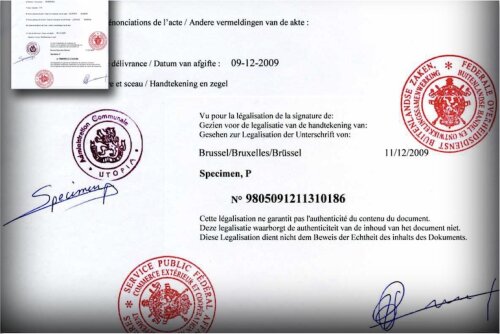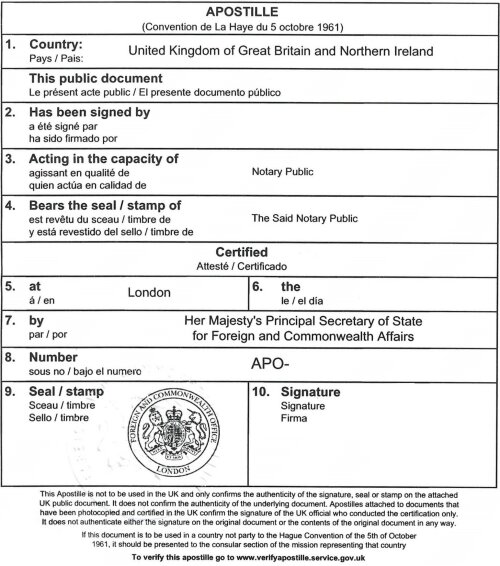Requirement for all admissions
As part of your application in Mobility Online you need to submit various supporting documents. If these documents have been issued by a national authority other than Belgium, the Belgian government requires that you submit legalised copies of each document. There are various options to legalise your document.
Need for authentication/legalisation?
How to get a document legalised?
The legalisation is done in the country where the document was issued. There are different procedures to authenticate a document. The procedure to follow depends on the country where the document was issued. Please always check the website of the Belgian Ministry of Foreign Affairs for the most recent information. When using this website, in the field ‘document group’, always choose ‘other documents drawn up or legalised by a competent local authority’.
Traditional legalisation
This procedure consist of a chain of individual authentications of the document. Initially the verification is done by officials of the country where the document was issued, secondly by the Embassy or Consulate where the document is to be used. Check the list of the countries for which a traditional legalisation is required. An example of a traditional legalisation is shown below.

Apostille
Countries that signed the Apostille Convention use a simplified legalisation procedure. The procedure is reduced to the issuance of a standard authentication certificate (or apostille) by an authority designated by the country where the public document was issued. Check the list of the countries for which an apostille is required. Please note that an apostille can only be provided by the designated authority. More details about these authorities can be found on this website. An example of an apostille is shown below.

Exceptions
Certified copy
Countries that signed the Brussels Convention of 25 May 1987 are exempted from the requirements of legalisation. For these countries a certified copy (a copy of the degree certificate stamped and signed by the issuing university) is sufficient. Check the list of the countries for which a certified copy is sufficient.
Additional legalisation requirements
For a small number of countries additional legalisation requirements are asked. Check the list of the countries with additional legalisation requirements. The requirements are set by the Belgian Ministry of Foreign Affairs. To have the most recent update it is advised to consult their website.
Chinese students
Chinese students that already need to provide an APS certificate are exempted from providing documents that are legalised by the Belgian embassy. Besides the APS certificate the following documents are required:
- a notarized copy of their degree certificate (including a notarized translation)
- a notarized copy of their transcript of records (including a notarized translation)
- a notarized attestation from the university regarding the graduation (including a notarized translation)
Students that are completely exempted from the APS procedure do need to submit a copy of their degree certificate/transcript/graduation certificate (including translations) that has been legalised by the Belgian embassy.
Which documents need to be legalised?
In the final phase of the admission procedure students need to provide a hard copy of the relevant degree certificate and a hard copy of the academic transcripts. These documents need to be accompanied by a translation in case the original documents are not drawn up in Dutch, French, German or English.
All these documents, including the translations, need to be properly legalised (see above ‘how to get a document legalised’). Documents that are certified in other ways than explained above will not be accepted. The degree certificate and the academic transcripts should be the same as the copies that were uploaded earlier electronically (in Mobility Online). In case your original degree certificate was legalised (instead of a copy of it), you will not be required to send us the original certificate. An ordinary copy will suffice along with the legalised copy of the transcripts. If admitted, you’ll be asked to present the original legalised diploma upon enrolment. Please note that ordinary copies of transcripts are never accepted during the authenticity screening.
Final year students, that have not graduated yet, should send an original letter from their home institution mentioning the programme they are studying, their status and the expected graduation date. The letter itself needs to be originally signed and stamped by the home institution. A legalisation is not required. These students will need to submit a legalised copy of the degree certificate later on, upon enrolment. Students that have applied in recent years and want to reapply, will not be asked to submit the same documents again. Application documents are kept during a certain period of time and can be re-used when reapplying.
Important information for applicants from Cameroon, Nigeria and Ghana
For applicants with a higher education degree from Cameroon, Nigeria and Ghana an additional direct confirmation from the home university will be asked on top of the legalisation. This measure is taken to avoid fraud. Please contact our helpdesk for more information.